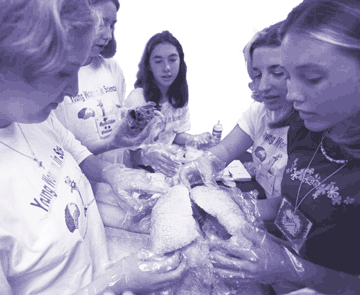A program developed by NIDA-supported researchers at the University of Kentucky in Lexington has begun introducing young women from rural Appalachia to the excitement of hands-on science-and to the possibility of pursuing a career in drug abuse research. The program-Young Women in Science-brings high school students to the university for intensive 3-week sessions each summer and five weekend sessions during the school year.
During the first summer session, completed last August, a group of 26 ninth-grade girls worked with resear-chers to learn basic concepts of physiology and biology and to understand the methods of scientific research. A second group of at least 26 young women will begin the program next summer.
 Learning about drug abuse research begins with lessons in anatomy and physiology for students selected for the Young Women in Science program at the University of Kentucky. Here the teenagers study structure and function of the lungs and heart. From left, Carter Florence, Amanda Melvin, Christina Davis, Samantha Prater, and Megan Howard. Photo by Jahi Chikwendiu, Lexington Herald-Leader.
Learning about drug abuse research begins with lessons in anatomy and physiology for students selected for the Young Women in Science program at the University of Kentucky. Here the teenagers study structure and function of the lungs and heart. From left, Carter Florence, Amanda Melvin, Christina Davis, Samantha Prater, and Megan Howard. Photo by Jahi Chikwendiu, Lexington Herald-Leader."Very few opportunities exist for young women from rural areas to learn about scientific research. This program offers them a chance to work with university professors during a summer session and to stay involved by working with women mentors back in their communities," says Dr. Carl Leukefeld, Director of the Center for Drug and Alcohol Research at the University of Kentucky College of Medicine. "Our hope is that it will attract more women to the field of drug abuse research, but an equally important goal is to get more young women exposed to and involved in male-dominated scientific fields."
During their second year in the program, the young women will concentrate on behavioral aspects of drug abuse and traditional treatment interventions. The third year will involve research that matches the young women with successful women scientists. Dr. Leukefeld developed the program curriculum in cooperation with colleagues at the University of Kentucky Center for Science and Health Careers.
The program includes a stipend for each summer session, and will provide a $1,000 college scholarship to each young woman who completes the 3-year program, whether they choose to major in science or some other subject.
"One of NIDA's goals has always been to attract young students, and in particular young women, to careers in drug abuse research," says Dr. Cathrine Sasek of NIDA's Office of Science Policy and Communications. "This program reaches out to rural areas of Appalachia to encourage young women to become involved in science and nurtures their interests by linking them with local community leaders, educators, or researchers who can serve as mentors."
The young women in the program were selected based on academic achievement in math and science, involvement in school and community volunteer activities, personal references, and their interest in pursuing a career in science.
